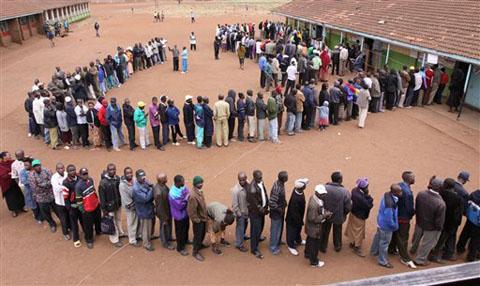Mariama Diallo | Washington06 August 2010
Photo: AP
Kenyans wait in long line up to cast their votes during the referendum for Kenya constitution in the Kibera slum, Nairobi, 04 Aug 2010
Share This
Related ArticlesPartial results from a referendum in Kenya show that voters overwhelmingly backed a new constitution to replace one from the colonial era. Opponents of the draft constitution have conceded defeat, but they called for immediate consultations on possible amendments.
Kenyans overwhelmingly and peacefully voted “yes” for a new constitution. Afterwards, Kenya’s electoral authority officially ratified the proposed constitution.
“For YES, 5,954,767. This represents 67.25 percent the votes. For NO,2,687,193. This represents 30.25 percent,” said Issack Hassan, interim chairman of Kenya’s Independent Electoral Commission.
Kenya’s President Mwai Kibaki campaigned for the constitution even though it contains new curbs on presidential powers. “Let us all prepare to play our part in the new Kenyan nation that we will be ushered in through a new constitution, once it is proclaimed,” he said.
The referendum was a critical part of an agreement that ended ethnic-fueled violence following the 2007 presidential elections. Energy Minister Kiraitu Murungi, head of the “yes” campaign, said the people of Kenya spoke with a “thunderous voice.” “Now the baby has been born…the breathtaking “yes” vote has confirmed Kenya as one strong united nation setting the standards for the continent and the entire world,” he said.
William Ruto, Kenya’s higher education minister and a leader of the “no” campaign admitted defeat but is calling for amendments. “As democrats we have said we accept the verdict of the people of Kenya. We are proposing a way forward that the contentious issues that were raised during the referendum…should now be addressed,” he said.
The new constitution addresses corruption, political patronage, land grabbing and tribalism. It also has greater checks on presidential powers and eliminate the post of prime minister. Opponents are against several provisions including language on abortion and Islamic courts.
Gerald LeMelle, executive director of Africa Action, a Washington based research institute, explains what the vote means for the average Kenyan. “It was significant to the average Kenyan because they were given a chance to have a say, their votes counted … and nobody whipped up ethnic hatred in order to satisfy their own personal interest,” he said.
But, LeMelle says, that was the easy part. “Now comes the hard part: the implementation in a way that moves Kenya forward. Right now, Kenya needs a leadership team put in place that is accountable. Once we have that accountability, then we can start making changes to the constitution because then it will be done responsibly. It’ll be done in the interest of Kenyan people,” he said.
In the United States, Secretary of State Hillary Clinton praised the vote. “I commend the people of Kenya for participating in large numbers and exercising their right to vote in a peaceful manner. This is an indication that a majority of Kenyans have voted for fundamental change,” he said.
Analysts say Kenya is a bellweather country, with the fourth largest economy in sub-Saharan Africa. Africans will be looking to see if the new constitution is implemented peacefully.


